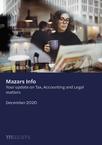
Mazars Info December 2020
Private Client Services
New annual tax on securities accounts?
Tax on securities accounts 1.0
A first tax on securities accounts entered into force in March 2018. This tax was due by individuals, holders of securities accounts whose joint targeted financial instruments were greater than or equal to 500.000 EUR per person. The rate of the tax on securities accounts was 0,15% on the average value of the targeted financial instruments on the securities accounts.
On 17 October 2019, the Belgian Constitutional Court declared the tax on securities accounts unconstitutional due to its discriminatory nature.
Tax on securities accounts 2.0
In November 2020, the Council of Ministers approved a draft bill with regard to a new annual tax on securities accounts. The Government intends to submit the bill to Parliament by year-end. If the bill is enacted it will most probably enter into force as from January 1, 2021.
We summarise the key features of the draft bill. The features are likely to evolve during the legislative process.
1. The scope of the new tax on securities accounts
The new tax on securities accounts would apply per security account with an average value that exceeds 1.000.000 EUR. The number of account holders / value per person is no longer important.
Securities accounts held by individuals, legal entities and even “legal arrangements” in the meaning of the Cayman Tax would fall within the scope of the new tax.
Residents would be taxable on securities accounts held in Belgium and abroad. Non-residents would be taxable on Belgian securities accounts.
All financial assets held on the securities account would be taxable, in contrast to the old tax under which a number of financial assets fell outside the scope (e.g. option contracts, turbos, trackers, ...).
Registered shares would not be targeted by this new tax.
2. The rate of the new tax on securities accounts
The rate of the annual tax on securities accounts would be 0,15% on the average value of the security account.
3. Anti-abuse clause
An anti-abuse provision would be introduced with regard to the annual tax on securities accounts as from 30 October 2020.
The following situations would fall within the scope of this anti-abuse measure:
- the split of a securities account to obtain an average value that does not exceed 1.000.000 euros;
- the opening of multiple securities accounts on which the securities are spread;
- the conversion of shares, bonds or other financial instruments into registered securities;
- the placement of a securities account subject to the tax in a foreign legal entity that transfers the securities to a foreign securities account; or
- the placement of a securities account subject to the tax in a fund whose units are placed in registered form.
If the above transactions are carried out at present, it must be justified that these transactions were not carried out with the intention of escaping the tax on securities accounts. The taxpayer must provide evidence.
Global Mobility Services
Disregard A1 form in case of fraud?
On April 2, 2020, the European Court of Justice reconfirmed their law practice concerning the A1 form that was obtained in a fraudulent way. Only under certain conditions, a fraudulent A1 certificate may be disregarded by the host country.
When certain conditions are fulfilled, a seconded employee can remain subject to the social security system of his home country while working in the host country. To prove this, the employee needs a so-called ‘A1 form’: a document delivered by the home country confirming that the seconded employee will remain liable to pay social security contributions in the home country.
In 2018, the European Court of Justice had already decided in the ‘Altun case’ that the host country is not bound by the A1 form when it was obtained in a fraudulent way and the home country failed to reexamine the certificate within a reasonable time.
This position was confirmed in the ‘Vueling case’, where the facts can be summarised as follows: Vueling employed ‘cockpit staff’ in France, whose employment contracts were subject to Spanish law, as well as ‘ground staff’, subject to French law. The cockpit staff was in the possession of A1 forms, issued by the Spanish authorities, declaring that they would remain subject to the Spanish social security system during their secondment to France.
However, the majority of these employees were hired by Vueling less than 30 days before the start date of their employment in France. Some were even hired on the starting date of the ‘secondment’. Also, certain people were domiciled at a French address, others were never residents of Spain.
Therefore, the French authorities stated that Vueling committed secondment fraud. In that context, the competent French authorities requested Spain to withdraw the delivered A1 certificates. At first, this was successful, but due to an objection by Vueling, the certificates were not annulled. At the same time, Vueling was found guilty by the French court of undeclared work in France. This raised the question whether the A1 forms should still have binding force when the criminal court of the host country already decided that there has been undeclared work and by consequence fraudulent A1 declarations.
The European Court of Justice has again confirmed its position in the Altun case of 2018, implying that the host country can only take action against the fraudulent A1 form if (1) the host country has already requested the home country to reconsider the issued A1 certificate, together with sufficient motivation and (2) the home country did not re-examine the A1 certificate within a reasonable period of time.
To summarize, A1 forms remain binding until withdrawn by the competent social security authority that delivered the A1 form, even when the factual situation does not correspond with the situation mentioned in the A1- application, unless the home country fails to reconsider the A1 form within reasonable time. The only practical issue remains that the notion “reasonable time” is not yet defined.
VAT
No VAT advance payment in December 2020
Businesses submitting quarterly or monthly VAT returns in Belgium should, in principle, pay an advance on the VAT due for the 4th quarter resp. December operations, by December 24.
However, under the Covid-19 supporting measures, the Belgian government has decided to suspend this year’s VAT advance payment. Taxpayers are not required to make this December advance payment in December 2020. The suspension applies to all taxable persons required to file a periodic VAT return, regardless of the regime to which they are subject (monthly or quarterly).
Legal
New rules concerning the UBO register
On October 1st, 2020, the Royal Decree of September 23, 2020 amending the Royal Decree of July 30, 2018 on the operating procedures of the UBO register, was published in the Belgian Official Gazette. This Royal Decree introduces some new provisions concerning the UBO register:
Mandatory documentation
Previously, there was a mere possibility to upload additional supporting documents to the UBO register when a registration was carried out.
However, the Royal Decree of September 23, 2020 now introduces the obligation to communicate to the register any document proving that the information relating to an ultimate beneficiary is adequate, up to date and accurate.
Examples of such documents include a copy of the shareholders’ register, the company’s articles of association, a shareholders’ agreement or a notarial deed. In addition, the FPS Finance requires that documents originating from a third country must be legalised.
Entities registered before October 11, 2020 have until April 30, 2021 to upload the additional required documents. Anyone carrying out a UBO registration as from October 11, 2020 must immediately submit the supporting documents.
Access to the UBO register
From now on, those who have access to the UBO register will also be able to see the modifications history, whereas in the past only the current information was visible.
Secondly, the Royal Decree of September 23, 2020 considerably broadens the access regarding (international) non-profit organizations and foundations. Without the obligation to prove any legitimate interest, every citizen now has access to the data of the following UBO categories: members of the board of directors of a foundation or a (I)NPO, the persons authorised to represent the NPO, the persons in charge of the daily management of the foundation and the (I)NPO, and the founders of a foundation.
Additional information obligation
A final noteworthy provision concerns the UBOs belonging to category 2 (“control by other means”). When registering these beneficiaries, it is now also necessary to indicate how the ultimate beneficial owner controls the company.
The Royal Decree of September 23, 2020 entered into force on October 11, 2020.
KEEP IN MIND THE DEADLINE !
VAT
- VAT return November 2020 : before December 20, 2020
Personal income tax return
- Personal income tax return - Belgian non-residents
- via proxyholder : January 15, 2021 (postponed)
Corporate income tax return
- Advance tax payments : December 21, 2020
- FY19 CBC-Report : December 31, 2020
- FY19 Master File : December 31, 2020
- FY20 CBC-Notification : December 31, 2020
- Non-resident corporate income tax return : January 15, 2021 (postponed)

